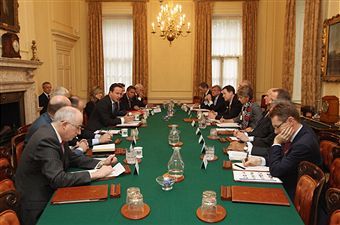 The British government is 99.9999999 percent staffed by apolitical Civil Servants with
the statistically irrelevant remainder being political appointees. The Sir Humphreys, rather than being pushed around, are very much in charge. Too much in charge.
The British government is 99.9999999 percent staffed by apolitical Civil Servants with
the statistically irrelevant remainder being political appointees. The Sir Humphreys, rather than being pushed around, are very much in charge. Too much in charge.
Ministers get only two Special Advisers – or SpAds – each who are placed away from the Minister’s office and in the beginning of the Government’s term often had to fight to even join meetings with their bosses. Some are knowledgeable experts other researchers with little experience beyond a few years in an MPs office.
In what looks like a partisan broadcast from Cabinet Secretary Gus O’Donnell, Rachel Sylvester in The Times (£) says “Civil servants can help think through and implement policy in an ordered way.” I agree – having worked with many impressive officials in London, Washington, Baghdad and Kabul.
Rather than being a cabal of useless time-servers, the Civil Service is a jewel in Britain’s institutional crown. Ministry of Defence officials for example are not an unnecessary waste, but needed to keep civilian control of the Armed Forces.
That said, officials work in certain ways. They are, on the whole, taught to be cautious. Very cautious. They rarely challenge the status quo, especially if senior officials have pronounced on a matter. Hierarchy is also respected even more so than in the Army, which actually allows for a lot of debate (the RAF is a different matter). Everyone knows everyone else’s grade.
Civil servants also paint the past in a Panglossian hue – refusing to say things internally, about UK operations in Iraq for instance, that the whole world knows to be true. Nobody ever wants to say, or write, that mistakes were made. That makes new thinking very difficult.
Officials also work in very defined boxes – unless you are at the top you don’t look across other areas of work than your own. In some departments, work on, say Yemen, is handled by a different division to that dealing with the Horn of Africa – though the two represent one, inter-connected problem.
Further, if there is one thing the Civil Service hates it is outside in-put. Ministers are on the whole kept away from external advice so that officials can control information and ensure decisions are pre-cooked by the time they reach a minister’s desk. The last thing they need is a real debate with a minister – debate should have been had before and the minister just needs to approve decisions. Don’t believe me? Look at the departmental organogram on the Cabinet Office website – many have their Permanent Secretary on top with no mention of the Minsters. The only exception is No 10, which operates more like a French-style cabinet than a British private office.
For these reasons, the Government will look back on its commitment to limit the number of Special Advisers with regret. Labour will, in turn, regret pouncing on the few political-looking
appointments the Government has made.
If it does not want to change its decision, then the Government should at least order an external review of the Civil Service. Unlike the Capability Reviews conducted under Labour, this review
should be genuinely independent and not staffed by Civil Servants. In fact, the fewer ex-Cabinet Secretaries on the review the better.
The Government wants to be radical. Getting rid of the Sir Humphrey culture that pervades the British system is a must if change is to take place.






Comments